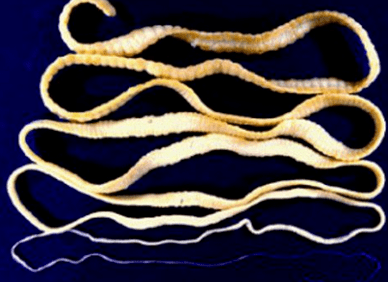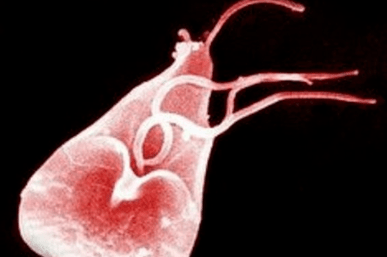Parasitic infections in the human body are a common phenomenon and may occur easily in both children and adults (first that they observe worse hygiene).The internal parasites have different locations in the carrier, their characteristics, structure, life cycle and more or less affecting the carrier.The symptoms may also vary depending on the appearance of parasites in the human body.

type
When talking about what parasitic infections are in human organs, many patients first think of worms.However, there are many other types of invasions.In the human body, two types of parasites are the most common.They have different life cycles and propagation properties because they need to be distinguished.
- The first is a worm that lives in the human body, otherwise known as a worm or worm.Piano invasion is mainly concentrated in the intestine, which can provide quite obvious symptoms and is easily diagnosed.And, overall, it is easy to heal and usually does not cause serious harm to adults and children.There are two types of such parasites - nematodes (rounded) and peeling worms.It is transmitted through the feces pathway, that is, in order for parasites in the human body to appear, it is necessary to swallow a large number of eggs that emit feces.
- Microscopic simple parasites of a person, amoeba, etc. are not obvious in the eyes.In this case, signs of parasites in the body are more obvious.It is more difficult to cure them, unlike the previous types, and it is difficult to diagnose.The impact of parasites on the human body is more important. This infection can lead to the development and aggravation of chronic diseases and even threaten life.The nature of transmission is feces, sometimes through blood and some other means.
It is very important to understand how parasites live in the human body, as this will help avoid infection.
type
Parasites can cause a variety of symptoms.Usually, it is localized in an organ or system they are surprised to have.Depending on the species, parasites in the body can only guide vital activities, diet and reproduction under certain conditions.Based on this, they are conditionally divided into species:
- intestinal tract (mainly round and flat worms - Pinworms, Ascarides, Tapeworms);
- liver (mainly microprotozoa-Lamblia, etc.);
- muscles (also mainly microscope);
- joints (same as before);
- Skin (slight heat, fungus);
- heart (mainly tiny or worm larvae damage);
- lungs (worms infected with worms);
- brain (larval forms of worms and simple organisms);
- Parasites in human blood (microprotozoa);
- Genitals in the uterus (usually worms, but this phenomenon is very rare).

Each listed group causes signs of certain parasites in the human body.Therefore, in order to diagnose the infection in a timely manner, you need to know that it may cause it.
localization
Although in many places, parasites live in the human body, the most common ones are worms as can be seen from the group of parasites listed above.These worms are localized, mainly in the intestine.Depending on the species, they can live in the small or large intestine.They breed there, lay eggs and eat.That is, the positive phase of its life cycle is underway.
These parasites in humans have a migration phase in which larvae fall into other organs (lungs, liver, brain, heart, muscles, etc.) and hit them.This is due to the fact that from the intestine, they fall into local areas and then fall into a common blood.Therefore, a person's parasite belongs to all organs and systems.But there, they form a capsule around the larvae, entering a state of rest.However, they can lead to the development of inflammatory processes, abscesses, sepsis.
For example, other people of Giardia settle in the liver.There, the most favorable environment is most favorable for them and therefore the smallest number in the gut and other systems.The same lifestyle is also a kind of.These parasites can map the smallest portion of their life cycle in the intestine, affecting mainly other organs.
Some parasites live on the body of the carrier.These are mainly one or another type of fungi.Depending on the species, they affect the skin, nails, scalp, mucous membranes.Glimmer is another pest that lives on the skin and its upper layers.
General Symptoms
The symptoms of parasites in the human body vary depending on which type of invasion it is.But almost everyone has two signs of characteristics - drunkenness and allergic syndrome.
- Parasite product poisoning develops due to physical poisoning.It is caused by absolutely all types of parasites in the body.It is expressed as a persistent weakness of carriers, pale, fatigue, chronic fatigue, lethargy.In children, intoxication can be expressed strongly in adults.
- The second common phenomenon that causes parasites in humans is the symptoms of allergies.This is due to the immune system's attempt to protect the body from alien agents, triggering the active production of histamine.If a large amount of blood accumulates in the blood, allergies will occur.Usually, the symptoms are mainly skin-ramps, urticaria, but it can also be the respiratory tract.
During the diagnosis phase of human parasites, we can draw conclusions by the presence of specific immunoglobulins in blood tests.Regardless of the nature of the invasive agent, the immune system produces specific antibodies to combat it.If there is such an antibody, it will infiltrate in the body.By type of antibodies, you can understand which one.
Specific symptoms
How parasites affect the body depends on their type.Each has specific parasitic infection symptoms.Intra-parasite infection (lamblosis, toxocarosis, Opistorhoz, etc.) and forms of worm invasion that actively infects the viscera during the migration phase.The first sign of this traffic is as follows:
- Increase body temperature, usually very large;
- Chills;
- Sweat a lot;
- Sometimes lymph nodes increase.
- If the parasite hits the lungs, there will be a mild cough, which will exacerbate and even enter pneumonia over time.
- If the liver is defeated, it increases and its soreness is observed.
- When placed locally on the skin, rashes and redness, peeling and itching appear;
- Intestinal worms, abdominal pain, bloating, flatulence, nausea, weight loss, which can lead to constipation or diarrhea;
- Positioning in the organs of the cardiovascular system, heart, arrhythmia, tachycardia and other rhythm disorders.
- Pain caused by parasites in muscles and joints is not obvious and occurs regularly in affected areas.
It can be said that human parasites exist in the human body, and other symptoms are also possible, but the above are the most characteristic.The most characteristic evidence in the intestinal worms is the discovery of individuals in chairs.
treat
A worm or the simplest person can live in a person long enough without showing himself.However, if an invasion is suspected, you need to be diagnosed immediately and diagnosed.A parasite or infectious disease expert will tell you how to treat an infection.
Use antiworm medicine for worm treatment.All specific drugs were divided into two groups.Preparations with wide-acting effects kill several types of parasites and invade with unknown pathogen prescriptions.When invasive agents are installed, formulations with narrow spectrum are specified, and their toxicity is less.
A person should take this medication once.After 7-10 days, a second prescription will be received to prevent possible self-invasion.Sometimes you can prescribe it in a short period of 3-5 days.The dose depends on the degree of invasion, drug type, patient weight and other factors.



























